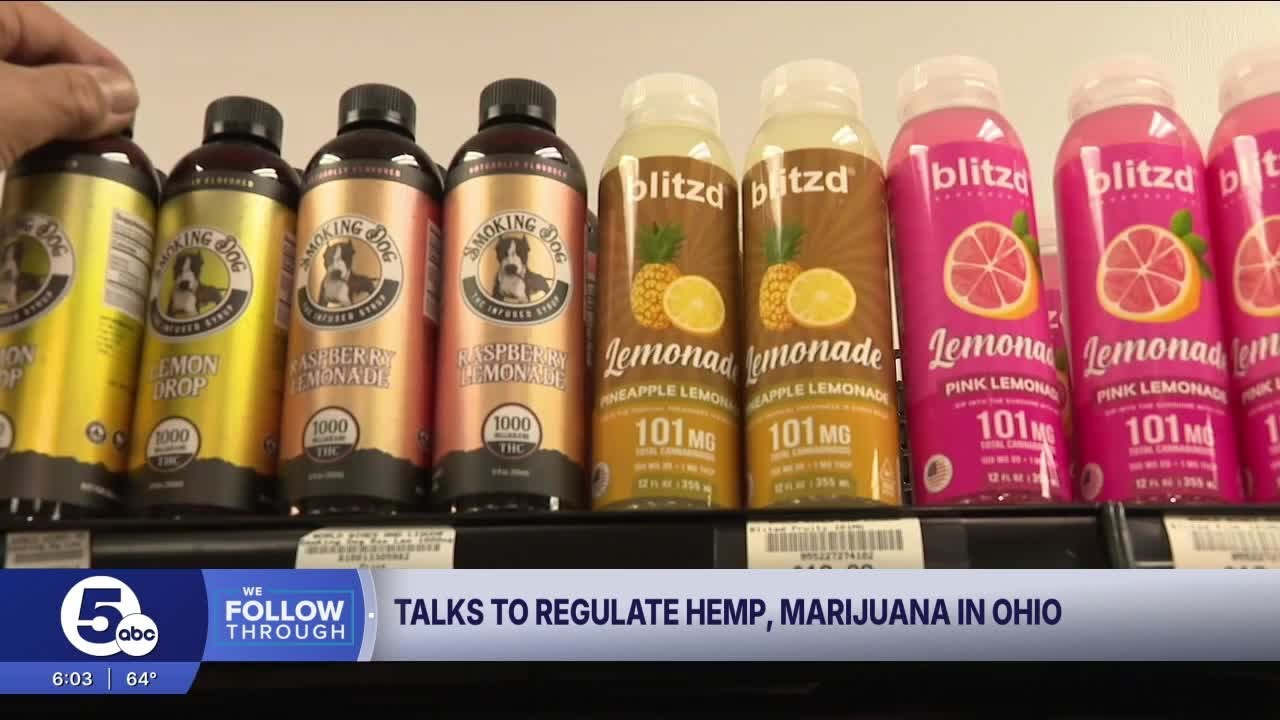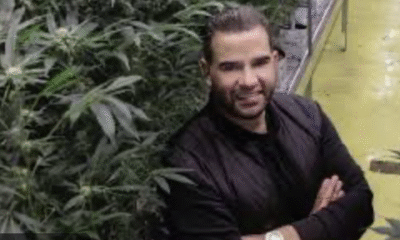featured
Ohio Lawmakers Will Take Up Bill To Revise Voter-Approved Marijuana Law And Add Hemp Market Restrictions This Week
Published
19 hours agoon

Ohio House lawmakers are set to take up a Senate-passed bill on Tuesday that would make significant changes to the state’s voter-approved marijuana legalization law—but with new key amendments that are expected to strike much of the current language and refocus the proposal on regulating intoxicating hemp products.
After months of back-and-forth between the House and Senate on how to navigate cannabis policy since adult-use legalization took effect, the latest plan is to take SB 56, sponsored by Sen. Stephen Huffman (R), and scale back controversial proposed restrictions on the marijuana market, while inserting provisions aimed at preventing youth access to consumable hemp.
The legislation would still address the state’s recreational marijuana program, however, with provisions touching on tax revenue allocation, according to a key lawmaker.
Rep. Jamie Callender (R), who has led the charge on marijuana policy in the House, told News 5 Cleveland that the forthcoming revised bill that’s scheduled for a hearing before the House Judiciary Committee on Tuesday will be “very thoughtful and targeted.”
Under the planned amendment, stores and breweries would be permitted to sell THC beverages, with new advertising restrictions meant to prevent appealing to youth.
“It will have a pretty complete ban other than the beverages, but it’s a temporary ban while some rules are being able to be developed so that will give more time,” Callender said. “But in the meantime, it will take the high-THC content stuff off the shelves, at least temporarily.”
The legislative effort on hemp comes after the governor issued an executive order temporarily banning intoxicating products derived from the crop, though that was later blocked by a judge pending litigation.
“Frankly, the legislature had not taken action,” Gov. Mike DeWine (R) said. “I’m still hopeful that the legislature will come in and actually take action.”

House Speaker Matt Huffman (R) commented on the relative lack of progress in advancing marijuana and hemp legislation since voters approved legalization at the ballot in 2023, noting substantive divides within the Republican caucus.
There are “folks who believe that marijuana should be legalized and regulated,” others “who believe that the hemp products should be on equal standing with everything that happened in the initiated statute and then “folks, like me, who are prohibitionists, who don’t think it should be legalized at all and it should be rare,” he said.
“I would say the prohibitionists have largely lost this discussion.”
The potential elimination of prohibitive marijuana rules in the current bill–which includes halving the number of plants adults could grow, adding new criminal penalties and removing select social equity provisions—might be welcomed by advocates and certain stakeholders. But the hemp industry is already sounding the alarm about the addition of policies they say could threaten the market.
For marijuana, the idea is that the legislation will be revised to ensure that tax dollars from adult-use sales are distributed to local governments “the way we had promised” and that “voters had promised,” Callender said.
Although the language has not yet been released, the U.S. Hemp Roundtable on Monday issued an alert warning that the proposal could “severely restrict access to many hemp products now sold at retail.”
“They are considering banning sales of many products now found in places like health food markets, groceries, and CBD stores and limiting sales to a small number of newly created ‘hemp dispensaries,’” the organization said. “We urge you to contact your state legislator today and tell them how important it is to your business and your customers to maintain broad retail access to hemp products in Ohio.”
Callender was asked why he thought it prudent to combine marijuana and hemp regulations in the pending bill, rather than simply move forward with a standalone measure dealing only with hemp as the chambers continue to debate marijuana rules.
“I think we may still end up going there if we have to,” he said. “If we put it all together, it may be harder for the Senate to say no to some of the marijuana things that we feel strongly about.”
“They can either accept it or not accept it,” he said. “If they don’t, it’ll go to conference committee, and it will force the chambers to work the issues out.”
Tuesday’s scheduled committee hearing comes weeks after DeWine issued emergency rules prohibiting the sale of intoxicating hemp products for 90 days, with instructions to the legislature to consider permanent regulations. Last week, however, a county judge enjoined the state from enforcing that policy in response to a legal challenge.
—
Marijuana Moment is tracking hundreds of cannabis, psychedelics and drug policy bills in state legislatures and Congress this year. Patreon supporters pledging at least $25/month get access to our interactive maps, charts and hearing calendar so they don’t miss any developments.![]()
Learn more about our marijuana bill tracker and become a supporter on Patreon to get access.
—
Meanwhile, last month, the Ohio Department of Cannabis Control (DCC) filed new proposed rules to build upon the state’s marijuana legalization law, laying out plans to update regulations on labeling and packaging requirements.
The proposal came weeks after Ohio medical and adult-use marijuana sales officially crossed $3 billion, data from the state Department of Commerce (DOC) shows.
The state sold about $703 million in recreational cannabis in the law’s first year of implementation, according to DCC data.
In March, a survey of 38 municipalities by the Ohio State University’s (OSU) Moritz College of Law found that local leaders were “unequivocally opposed” to earlier proposals that would have stripped the planned funding.
Meanwhile in Ohio, adults as of June are able to buy more than double the amount of marijuana than they were under previous limits, with state officials determining that the market can sustainably supply both medical cannabis patients and adult consumers.
The governor in March separately announced his desire to reallocate marijuana tax revenue to support police training, local jails and behavioral health services. He said funding police training was a top priority, even if that wasn’t included in what voters passed in 2023.
Ohio’s Senate president has also pushed back against criticism of the Senate bill, claiming the legislation does not disrespect the will of the electorate and would have little impact on products available in stores.

Author: mscannabiz.com
MScannaBIZ for all you Mississippi Cannabis News and Information.
You may like
-


Raw Garden Acquires ‘California Love’ to Grow Clean Cannabis Movement
-


Rhode Island Marijuana Officials Approve Timeline For Awarding New Dispensary Licenses
-


‘Rent-a-License’ Scheme Highlights New York Cannabis’s Track-and-Trace Problem
-


Alcohol Industry Steps Up Lobbying On Hemp Drinks As Congress Debates THC Ban
-


Cannabis Mogul Appointed Ambassador To Middle East Country
-


Pennsylvania Senators Approve Bipartisan Cannabis Bill To Create New Regulatory Body
featured
Raw Garden Acquires ‘California Love’ to Grow Clean Cannabis Movement
Published
35 minutes agoon
October 21, 2025
[PRESS RELEASE] – SANTA BARBARA, Calif., Oct. 21, 2025 – Raw Garden, California’s leader in clean cannabis for more than a decade, announced the acquisition of the California Love cannabis brand in a move focused on increasing access to clean and safe cannabis across the state. The deal comes as part of Raw Garden’s highly selective approach to growth and partnerships, rooted in the ethos of supporting small, values-aligned farms that are connected to their communities and meet their highest standards.
Founded in 2015, Raw Garden has been a part of the Clean Green Certification Program since the beginning. The company remains committed to testing for hundreds of pesticides and potential contaminants, far more than the 66 currently required by the state, and offers 100% transparency by publishing all results on its website. Earlier this year, Raw Garden also helped launch ECCO (Environmentally Conscious Consumer Organization), because the cannabis industry needed a higher standard – one built on safety, purity and sustainability.
For Raw Garden, clean isn’t just a buzzword; it’s an obsession. Every farm and facility undergoes rigorous compliance checks to ensure that when you choose Raw Garden, you’re choosing clean, contaminant-free cannabis every time.
“The purchase of California Love will expand the clean cannabis movement as well as serve as inspiration for others who want to make the switch to clean farming practices,” Raw Garden CEO Thomas Martin said. “We are excited about the growth we have seen with California Love, and the goal with this purchase is to provide easier access for people who want clean, pure cannabis flower.”
Based in Grover Beach, California Love is currently available in more than 130 retailers throughout the state. Going forward, the brand will be subject to the same rigorous standards as Raw Garden and undergo the same third-party testing to ensure consumers of both brands enjoy the same clean quality and attention to detail.
“For us, the certifications aren’t just a badge; they’re a reflection of our obsession with clean cannabis,” Raw Garden Vice President of Manufacturing Mickey Esdale said. “From our oil-based vapes to our flower, every product is held to the highest standard, because purity should never be optional. We don’t just meet industry standards; we push them forward. Our customers deserve full transparency and the confidence that what they’re smoking is as clean and sustainable as it gets.”

Author: mscannabiz.com
MScannaBIZ for all you Mississippi Cannabis News and Information.
featured
Rhode Island Marijuana Officials Approve Timeline For Awarding New Dispensary Licenses
Published
2 hours agoon
October 21, 2025
“We reserve the right to delay this process depending on several external factors outside our control. For example, if we receive thousands of applications, it will be hard for us to do that.”
By Christopher Shea, Rhode Island Currant
Rhode Island’s cannabis regulators could begin awarding new retail licenses to prospective business owners eager to join the state’s budding market as early as May 2026.
That’s according to a timeline the Cannabis Control Commission voted 2-1 to adopt on Monday. The timeline sets the pace for officials to review applications for the state’s 24 available retail licenses after the application deadline on December 29, 2025.
“It’s clear to me that we need to do a better job forecasting what the next months look like after the application portal closes at the end of this calendar year,” Commission Chairperson Kimberly Ahern said. “We have never shared what 2026 held.”
Starting January 1, 2026, the state’s Cannabis Office will have 90 days to review applications and verify that each meets eligibility qualifications before being placed in a lottery. The timeline builds in at least 60 days to allow applicants to secure approvals at the local level in order to qualify for random selection, Ahern said.
Ahern said the intention is to begin the lottery selection process in the second quarter of 2026, likely in May.
“I want to add that we reserve the right to delay this process depending on several external factors outside our control,” Ahern said. “For example, if we receive thousands of applications, it will be hard for us to do that.”
As of Monday, no retail applications have been submitted to the state’s cannabis office, spokesperson Charon Rose told Rhode Island Current after the meeting.
Objections on getting ducks in a row
Commissioner Robert Jacquard, the lone vote against regulators’ review timeline, argued that allowing businesses to secure local zoning approvals after the application deadline is unfair to those who met the requirements on time.
“If an applicant is better prepared, better financed, got an earlier start, I think that’s important,” he said. “We have had our regulations out for a good amount of time, people were well-warned that there would not be any extensions beyond the deadlines that were set.”
Those same feelings were shared by many of the members of Rhode Island’s cannabis industry who attended the meeting within the Public Utilities Commission’s office building in Warwick.
“Many of us have invested significant time and money securing compliant locations, paying for rent, purchasing properties, and obtaining special use and zoning permits,” Karen Ballou, owner of CultivatingRI, told commissioners. “I recognize some municipalities have made it difficult for applications to meet certain requirements, but that should not penalize those who have successfully navigated the process.”
Business owners awarded medical cannabis licenses have faced setbacks opening in Woonsocket and Foster amid disputes with local officials and property owners, causing them to miss the state’s initial nine-month deadline to begin operations.
And not every town is willing to have a cannabis retailer. In 2022, voters in six communities—Barrington, East Greenwich, Jamestown, Little Compton, Scituate and Smithfield—rejected allowing retail pot shops within their borders.
Ballou said if regulators really need to give some applicants more time to get all their needed material together, those businesses should be subject to a second lottery.
Sasha Gorski, co-owner of the cultivation company Talaria, agreed, saying the 60-day window to secure local zoning permits after the application deadline shouldn’t apply to general retail applicants.
“It hurts to be punished for being ahead,” she said.
But others in the room argued the commission’s review timeline helps to create a sense of fairness as the retail industry starts to grow in Rhode Island.
“Applicants need breathing room to go through the proper channels,” Emma Karnes, an organizer for United Food and Commercial Workers Local 238, told the commission. “I think we all want a healthy pool of applicants. We all want a reasonably accessible application process.”
Karnes said many applicants seeking social equity and worker cooperative licenses may not have the same resources and capital as other prospective business owners. Such is the case for Alexa Goodrich-Houska, who is seeking to open the Living Room Cannabis Cooperative somewhere in Zone 1, which includes the communities of Burrillville, Cumberland, Glocester, North Smithfield, Smithfield and Woonsocket.
“We don’t have trust funds, we don’t have big corporate backers,” Goodrich-Houska said. “Documentation alone can take four to 12 months and around $50,000 to know if we can even get a license.”
That’s on top of the $7,500 application fee, a yearly $30,000 licensing fee that all cannabis retailers face—though that application fee will be waived for the first year for approved social equity applicants.
Ahern acknowledged industry members’ concerns and continued frustration over new licenses not yet being issued, but reminded them it was never going to be a rubber stamp process.
“We expect a very robust, thorough process,” she said. “That was never going to be done overnight, that was never going to be done in a few weeks.”
Under the 2022 act that legalized recreational cannabis, the commission can offer 24 new licenses to retailers, with six reserved for social equity applicants and another six reserved for worker-owned cooperatives. All recreational licenses will be spread throughout six geographic zones, with a maximum of four stores per zone.
Applicants have up to 60 days to demonstrate they have final zoning approval from the municipality where they intend to operate their business—a provision Ahern said was included partly because of the commission’s slow rollout in getting potential social equity applicants certified.
The commission in late August opened the initial screening process for social equity applicants, defined as prospective retailers owned or mostly staffed by those adversely affected by the war on drugs. After the certification deadline closed on September 29, the commission reported 94 potential applicants for the state’s six social equity licenses.
Beginning Monday, screened applicants were expected to receive letters informing them if they meet the state’s social equity criteria. Prospective applicants who don’t initially meet the commission’s requirements will have 10 additional days to prove they qualify as social equity applicants.
Regulations approved by the commission earlier in the year require that social equity applicants have at least 51 percent ownership and control by individuals directly impacted by past cannabis laws or economic disparities, or a minimum of 10 full-time employees that meet the same criteria.
Qualifying factors include convictions for nonviolent cannabis offenses or residency in disproportionately impacted areas—which can be determined by federal poverty level, unemployment rate, the number of students in a free school lunch program and historic arrest rates by census tract.
Final certification is expected to be approved by the commission some time in November.

Author: mscannabiz.com
MScannaBIZ for all you Mississippi Cannabis News and Information.
featured
‘Rent-a-License’ Scheme Highlights New York Cannabis’s Track-and-Trace Problem
Published
3 hours agoon
October 21, 2025
New York cannabis regulators are attempting to oust a licensed operator from the adult-use marketplace whom they’re accusing of “aiding and abetting” in unlicensed processing activity through a reverse licensing scheme.
The state’s Office of Cannabis Management (OCM) filed multiple charges Oct. 20 against Omnium Health Inc. (d/b/a Omnium Canna), a licensed adult-use processor and distributor in Long Island.
The OCM claims that a February 2025 investigation uncovered contracts between Omnium and unlicensed operators whom Omnium charged rent, allowing them to use its facilities and resources to manufacture and package cannabis products that landed on licensed dispensary shelves as part of a “rent-a-license” scheme.
“Omnium’s alleged conduct is a blatant breach of the licensing rules designed to ensure transparency and fairness in the legal market,” OCM Executive Deputy Director Felicia A. B. Reid said in an Oct. 20 press release. “Our state’s cannabis laws are clear: Licenses are not transferable and only licensed operators may produce and distribute cannabis. OCM’s move today ensures that regulated businesses do not exploit loopholes or take advantage to undermine legal operators who play by the rules.”
In filing a notice of pleading, OCM is attempting to revoke Omnium’s licenses and prevent the company from applying for future licensure.
The state’s regulators are also seeking civil penalties related to the projected revenue from the sale or possession of any unregulated cannabis products, as well as the recall and destruction of those unregulated products.
“Omnium’s actions violated core principles of our regulatory framework and placed unvetted operators into the heart of New York’s legal market,” said Stephen Geskey, OCM deputy executive director of labs, compliance and licensing. “This is a textbook example of reverse licensure, and OCM will not tolerate it.”
The possibilities of “reverse licensure” in New York’s adult-use cannabis market are exacerbated by the state’s delay in implementing a third-party seed-to-sale tracking system nearly three years after adult-use dispensary sales launched in December 2022.
The OCM plans to integrate track-and-trace provider Metrc’s software and technology into the state’s adult-use program by Dec. 17 for all licensees. Access to Metrc’s application programming interference (API) and testing endpoints will be available on Oct. 12 for operators to begin the transition.
The majority of state cannabis programs have a third-party provider, like Metrc or BioTrack, to help prevent product diversion or inversion. Without a system in place, former New York Cannabis Control Board Member Jennifer Gilbert-Jenkins called product inversion the state’s “dirty secret” during a December 2024 board meeting.
“How are we validating that the products in stores are actually coming from New York State?” she questioned. “Because the rate of inversion in this market is the dirty secret that everybody is talking about … that the amount of product that’s coming into our legal, authorized dispensaries from out of state is displacing New York product.”
In February 2025, the OCM launched a Trade Practices Bureau dedicated to safeguarding the integrity of the state’s cannabis program through investigating violations, abuse and noncompliance to hold “bad actors” accountable.
In seeking revocation, debarment and monetary penalties against Omnium in this week’s announcement, the OCM also ordered a statewide retail recall of Omnium-linked products. In Monday’s release, the OCM included a photo of a product’s packaging labeled “Omnium d/b/a MFused.” OCM investigators concluded that MFused rented Omnium’s premises and license.
In covering the OCM’s investigation, The New York Times reported that not only is Mfused connected to Omnium, but so too are popular brands Stiiizy and Grön. The article states that Grön continues to rent space in Omnium facilities and draws attention to another article that details Grön’s business partnerships with licensees in other states.
Grön, which has a Type 2 processing license in New York, called the NYT’s article “inaccurate” in a company statement provided to Cannabis Business Times:
“We are disheartened and disappointed with the inaccurate reporting done by the New York Times today in an article that misrepresents our relationships, business practices and general code of conduct in New York. The article, about challenges facing a former partner of ours in New York State, suggests that Grön – a company with an unparalleled reputation in the cannabis industry for transparency and compliance, which are core values of our business – participated in improper licensing and manufacturing in New York State. These claims are entirely false, and we implore the New York Times to review this matter and issue a correction at once.”
An edibles brand from Oregon, Grön contests that it operates in a building completely independent of Omnium under full compliance with the OCM.
“Our relationship with Omnium was short, and during that time, Grön operated in total compliance with OCM’s regulations, which expressly permit out-of-state brands to partner with existing New York processing licensees, proving there is zero merit to any story of questionable material being used,” according to the company statement.
In February, the OCM’s newly launched Trade Practices Bureau (TPB) examined Omnium’s audit and inspection records, reviewed contracts between the company and other businesses, and interviewed several witnesses, according to the OCM.
In Monday’s notice of pleading, the OCM also accused Omnium of material misrepresentation and failing to disclose substantial changes to its business operations.
“Reverse licensing has no place in New York’s market,” TPB Director James Rogers said. “This kind of cheating robs compliant businesses of their right to compete in a fair market. Acting Executive Director Reid set up the bureau to address these kinds of threats to market integrity. The TPB team is grateful to all the individuals who came forward with crucial information and encourage others to do the same. If we work together, we can keep New York’s cannabis market above board.”

Author: mscannabiz.com
MScannaBIZ for all you Mississippi Cannabis News and Information.

Raw Garden Acquires ‘California Love’ to Grow Clean Cannabis Movement

Rhode Island Marijuana Officials Approve Timeline For Awarding New Dispensary Licenses

‘Rent-a-License’ Scheme Highlights New York Cannabis’s Track-and-Trace Problem

Alcohol Industry Steps Up Lobbying On Hemp Drinks As Congress Debates THC Ban

Cannabis Mogul Appointed Ambassador To Middle East Country

Pennsylvania Senators Approve Bipartisan Cannabis Bill To Create New Regulatory Body

Ahead Of New Jersey Governor Election, GOP Candidate’s Comments On Marijuana As A ‘Gateway Drug’ Resurface

Urgent Action Needed To End US Marijuana Arrests

Supreme Court takes up cannabis & gun rights case (Newsletter: October 21, 2025)

What Winning Looks Like: The New Jersey Dispensaries Playing a Different Game

Trump Taps Marijuana Industry ‘Visionary’ As Special Envoy To Iraq

Delaware Scam Claiming to Represent State-Licensed Dispensary Offering Illegal Cannabis Deliveries – Ganjapreneur
New York Should Legalize Psilocybin Therapy, Former Narcotics Prosecutor Says (Op-Ed)

Do Public Votes About Cannabis Matter Currently

Ohio Lawmakers Will Take Up Bill To Revise Voter-Approved Marijuana Law And Add Hemp Market Restrictions This Week

The Best Microdosing Strains For A Rough Week
Rubicon Organics Announces Health Canada Cultivation License For Cascadia Facility

Building Community, One Bagel at a Time

Supreme Court to Decide Whether Federal Gun Ban Applies to Cannabis Consumers

Florida Marijuana Legalization Campaign Sues State Over Alleged ‘Unlawful’ Attempt To Invalidate 200,000 Signatures For 2026 Ballot Initiative

Does Skateboarding Need To Level Up

Planet 13 Opens 34th Florida Dispensary in Pace

A Long Strange Trip: Yelawolf and Edward Crowe Bring Blotter Art to Life

La Crosse, WI Reduces Marijuana Possession Penalties to $1 Fine

Alert: Department of Cannabis Control updates data dashboards with full data for 2023

Connecticut Appoints The US’s First Cannabis Ombudsperson – Yes there is a pun in there and I’m Sure Erin Kirk Is Going To Hear It More Than Once!

5 best CBD creams of 2024 by Leafly

Recreational cannabis on ballot for third time in South Dakota

EU initiative begins bid to open access to psychedelic therapies
New Study Analyzes the Effects of THCV, CBD on Weight Loss

5 best autoflower seed banks of 2024 by Leafly

Free delta-9 gummies from Bay Smokes

Discover New York’s dankest cannabis brands [September 2024]

May 2024 Leafly HighLight: Pink Runtz strain

Press Release: CANNRA Calls for Farm Bill to Clarify Existing State Authority to Regulate Hemp Products

5 best THC drinks of 2024 by Leafly

Local medical cannabis dispensary reacts to MSDH pulling Rapid Analytics License – WLBT

6 best CBD gummies of 2024 by Leafly

Curaleaf Start Process Of Getting Their Claws Into The UK’s National Health System – With Former MP (Resigned Today 30/5/24) As The Front Man

Horn Lake denies cannabis dispensary request to allow sale of drug paraphernalia and Sunday sales | News

5 best delta-9 THC gummies of 2024 by Leafly

Mississippi city official pleads guilty to selling fake CBD products

The Daily Hit: October 2, 2024

Nevada CCB to Accept Applications for Cannabis Establishments in White Pine County – “Only one cultivation and one production license will be awarded in White Pine County”

5 best THCA flower of 2024 by Leafly

Weekly Update: Monday, May 13, 2024 including, New Guide for Renewals & May Board meeting application deadline

6 best hemp pre-rolls of 2024 by Leafly

PRESS RELEASE : Justice Department Submits Proposed Regulation to Reschedule Marijuana
Trending
-

 California Cannabis Updates1 year ago
California Cannabis Updates1 year agoAlert: Department of Cannabis Control updates data dashboards with full data for 2023
-

 Breaking News1 year ago
Breaking News1 year agoConnecticut Appoints The US’s First Cannabis Ombudsperson – Yes there is a pun in there and I’m Sure Erin Kirk Is Going To Hear It More Than Once!
-

 best list1 year ago
best list1 year ago5 best CBD creams of 2024 by Leafly
-

 Business1 year ago
Business1 year agoRecreational cannabis on ballot for third time in South Dakota
-

 Business1 year ago
Business1 year agoEU initiative begins bid to open access to psychedelic therapies
-

 cbd1 year ago
cbd1 year agoNew Study Analyzes the Effects of THCV, CBD on Weight Loss
-

 autoflower seeds1 year ago
autoflower seeds1 year ago5 best autoflower seed banks of 2024 by Leafly
-

 Bay Smokes1 year ago
Bay Smokes1 year agoFree delta-9 gummies from Bay Smokes



